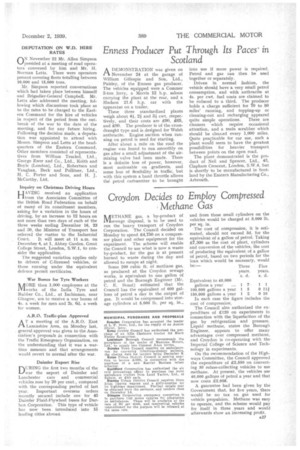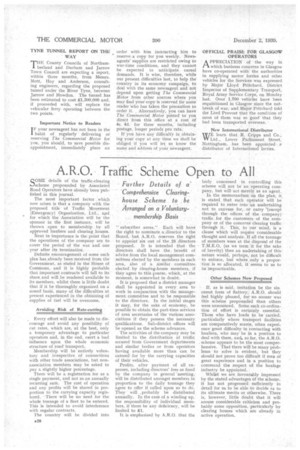Croydon Decides to Employ compressed
Page 29

Page 30

If you've noticed an error in this article please click here to report it so we can fix it.
Methane Gas
NiTETHANE gas, a by-product of alsewag,e disposal, is to be used to run the heavy transport of Croydon Corporation. The Council decided on Monday to spend £4,750 on a compressor plant and other equipment for the experiment. The scheme will enable the Council to use what is now a waste by-product, for the gas is at present burned to waste during the day and allowed to escape at night.
Some 200 cubic ft. of methane gas, as produced at the Croydon sewage works, is equivalent to one gallon of petrol and the Borough Engineer (Mr. C. E. Boast) estimated that the Council has the equivalent of 600 gallons of petrol a day in the output of gas. It would be compressed into storage cylinders at 5,000 lb. per sq. in., and from these small cylinders on the vehicles would be charged at 3,000 lb. per sq. in. The cost of compression, it is estimated, should not exceed 3d. for the equivalent of a gallon of petrol. Taking £7,300 as the cost of plant, cylinders and conversion of the vehicles, the cost of producing the equivalent of a gallon of petrol, based on two periods for the loan which would be necessary, would be:— Three Five years. years.
s. d. s. d.
Equivalent to 40,000 gallons a year ... 1 7 • 1 1
100,000 gallons a year 1 5 0 1
150,000 gallons a year 1 2 0 10 In each case the figure includes the cost of compression, The Council also authorized the expenditure of £120 on experiments in connection with the liquefaction of the gas by refrigeration and pressure. Liquid methane, states the Borough Engineer, appears to offer many advantages over compressed methane, and Croydon is co-operating with the Imperial College of Science and Technology in experiments.
On the recommendation of the Highways Committee, the Council approved the expenditure of £2,550 on converting 30 refuse-collecting vehicles to use methane. At present, the vehicles use 40,000 gallops of petrol a year and that now costs £2,958.
A guarantee had been given by the Government that, for five years, there would be no tax on gas used for vehicle propulsion. Methane was easy to operate, and the scheme would pay for itself in three years and would afterwards show an increasing profit. TYNE TUNNEL REPORT ON 11-IE order with him WAY
THE County Councils of Northumberland and Durham and Jarrow Town Council are expecting a report, within three months, from Messrs. Mott, Hay and Anderson, consulting engineers, regarding the proposed tunnel under the River Tyne, between Jarrow and Howdon. The tunnel has been estimated to cost £1,300,000 and, if proceeded with, will replace the vehicular ferry operating between the two points.
Important Notice to Readers IF your newsagent has not been in the 1 habit of regularly delivering or reserving The Commercial Motor for you, you should, to save possible disappointment, immediately place an instructing him to reserve a copy for you weekly. Newsagents' supplies are restricted owing to war-time conditions, and they cannot be expected to anticipate casual demands. It is wise, therefore, while our present difficulties last, to help the country in its economy campaign, to deal with the same newsagent and not depend upon getting The Commercial Motor from other sources where you may find your copy is reserved for some reader who has taken the precaution to order it. . Alternatively, you can have The Commercial Motor posted to you direct from this office at a cost of 4s. 4d. for three months, including postage, longer periods pro rata. .
If you have iny'difficulfy in obtaining your copy at any time we shall be obliged if you will let us know the name and address of your newsagent. OFFICIAL PRAISE FOR GLASGOW OPERATORS
A PPRECIATION of the way in
which business concerns in Glasgow have co-operated with the authorities in supplying motor lorries and other vehicles for the Services was expressed by Major Lloyd Pritchard, District Inspector of Supplementary Transport, Royal Army Service Corps, on Monday last. Over 1,700 vehicles have been requisitioned in Glasgow since the outbreak of war, and Major Pritchard told the Lord Provost that the condition of most of them was so good that they had been transported overseas.
New International Distributor
WE learn that R. Cripps and Co., Ltd., Lower Parliament Street, Nottingham, has been appointed • a distributor of International lorries.




































































